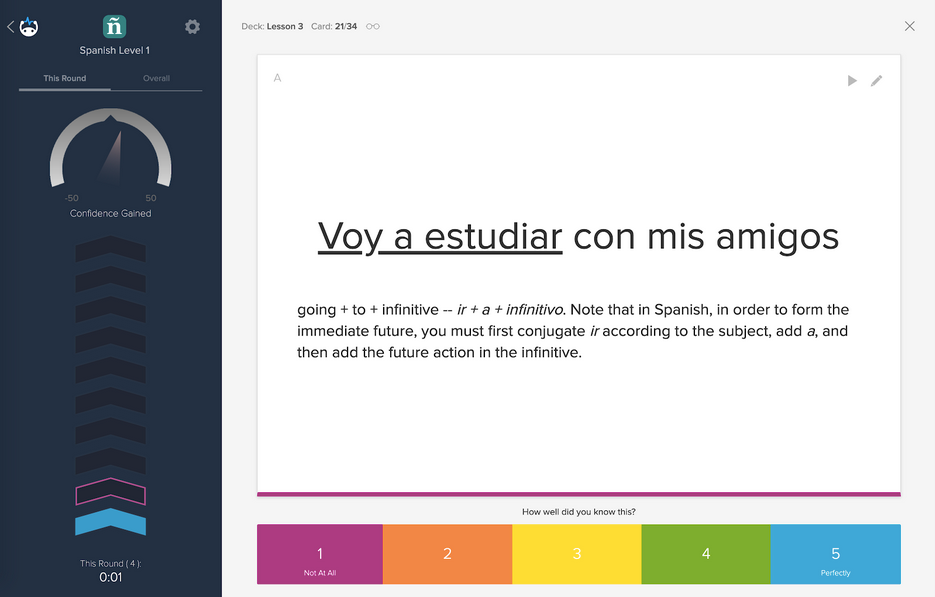You may have never heard of the zone of proximal development, but you’re probably already familiar with it.
Do you know how to ride a bike? If so, it is likely you started with training wheels. Remember those? The little wheels on either side of the rear bike wheel that were often so uneven that as you blazed around the neighborhood, handlebar streamers flying back, you bobbled from side to side, producing that telltale training-wheel clatter.
You have probably never considered why so many of us started with these training aids, because the answer seems obvious: it is too challenging to learn to ride a bike all at once. Instead, you need to master some of the individual skills one at a time and in an appropriate incremental sequence.
This is the importance of scaffolding in education and learning. For maximum learning efficiency, you should always be working on things that are just a bit harder than your existing skill level, but not too hard.

With this in mind, have you ever considered how many other skills in your life you might be trying to learn without the appropriate training aids or without the appropriate incremental steps? It turns out that effectively managing such scaffolding is the most important way to optimize your learning.
Enter the zone of proximal development (ZPD)
Across development, we have both physical and mental limitations that may allow us to grasp some concepts earlier than others. This idea was codified in the seminal work of a Soviet psychologist, Lev Vygostky.
Vygostky recognized that at any particular developmental level there are:
- certain problems that a child can solve without aid,
- certain problems that a child can solve with aid, and
- certain problems that a child will most likely never be able to solve at this particular stage.
Much of education focuses on the second type of problem—the problems that are within reach of the child’s developmental capabilities … with a little help. Thus, in Vygotsky’s language, the problems that fall into this category are considered problems within “the zone of proximal development” (ZPD).
The ZPD is most often described as the difference between what the learner can do without help and what they can do with help. In Vygotsky’s own words: "the distance between the actual developmental level as determined by independent problem solving and the level of potential development as determined through problem solving under adult guidance, or in collaboration with more capable peers."
As teachers, parents and siblings, we try to provide this aid. By creating this zone of proximal development, we help our children move beyond what they can do alone.
But have you ever considered why the ZPD could be an important concept for you?
You’re probably not a child. And, it is likely that many of you don’t think about how you learn on a regular basis. In fact, you may even believe that you are not learning much on a daily basis … at least, not compared to the learning you did in school or more generally, when you were a child.
Certainly you have moved beyond the developmental stages targeted by Vygostky and have moved beyond the place and time when the ZPD may have been a relevant concept (at least in its strict Vygotskyian conceptualization).
However, I argue that we are all still “learners” to some degree. And, I challenge you to think about the types of learning you might be doing on a daily basis and how the general concept of ZPD could reframe your approach to this learning.
Getting into “El Zono”
For example, I moved to Spain five years ago without any fluency of the Spanish language. My husband, however, had been learning Spanish on and off for about ten years and thus entered with a basic ability to understand and be understood. At some point in the first year, my husband gave me the following advice: If I didn’t know the Spanish translation for a word, simply add a Spanish ending (and pronunciation) to an English word, and more often than chance, I would be understood.
This seems like easy advice—and those of you who speak Spanish (or a foreign language) may understand exactly what he meant. But when he told me this, I had not yet internalized the pattern of the language and although I could conceptually understand the steps (take a noun (e.g., investigation) and change the ending from ‘tion’ to ‘cion’, and emphasize the ending—“investigación”!), I could not do it naturally. It felt forced, awkward, and inevitably came out as a mangled Spanglish word.
But later, I remember having an “ah ha” moment where I found myself naturally “Spanishizing” English words, and remembering my husband’s earlier advice with more appreciation. His advice had just come a little too early in my learning process—it had been outside my zone of proximal development.
The danger of learning outside of the zone of proximal development
Can you think of any examples where you failed due to a training aid, a set of instructions, or a tip from a friend that came too early in your learning process? It happens most often when learning a new skill—such as learning to drive or learning to play golf.
However, have you ever had a well-meaning super-athletic friend try to give you advice on how to improve your golf swing or how to do a controlled skid on the snow? And, although their instruction makes sense conceptually, you are simply unable to implement it correctly because it's too many steps from your current skill level … so you continue to slice the ball or you skid directly into the snow bank?
If that situation sounds familiar, it's because your friend's instruction was beyond your zone of proximal development.
What happens when we fall outside of our ZPD—our learning sweet spot?
We don't learn very much. If something is too easy, you won't get any learning benefits from doing it. And, if something's too hard, you won't learn anything either. You might get frustrated and give up. In both cases, you're not learning.
The importance of scaffolding in education

This is where scaffolding comes in. Scaffolding is just the process by which we use learning supports to make challenging tasks a little easier so that they fall in our ZPD. The zone of proximal development suggests that to learn effectively, you need to challenge yourself—but not too much. Scaffolding helps take those tasks that are too difficult and makes them easy enough so that they're still challenging but not too much.
In your own learning, you might already do this: you create an incremental learning process whereby your advancement depends on a step-by-step graded (easy to hard) learning sequence and training aids (whether animate or inanimate).
How Brainscape takes advantage of the ZPD
Brainscape uses an adaptive flashcards algorithm to ensure that your learning continues to fall in your ZPD. Basically this makes sure you're always in the ZPD and always learning efficiently. It's part of the magic of our software.
Brainscape keeps you in your ZPD in two main ways:
- The first is through spaced repetition. Brainscape repeats concepts in just the right intervals of time, based on your own self-assessment in your confidence level on a scale of 1 to 5.
- The second way is by ensuring you never see too much difficult content at once. If you rank several Brainscape flashcards in a row as a "1" indicating you don't know that information at all, the algorithm ensures you won't see any new information until those ratings increase.
That's because we know the importance of scaffolding in education: you need to build up a solid foundation before you see new information.

These two features are just a few of the ways that Brainscape has been designed to use cognitive science to ensure you're optimizing you're learning. Together with active recall, metacognition, and spaced repetition, these features make our platform the most advanced digital learning platform out there.
Stay in the ZPD to keep your learning optimized
The zone of proximal development may seem like an obvious concept, especially when thinking about child’s learning. But it’s worth considering when you’re learning something new as an adult, too.
Take a minute next time you are frustrated by how slowly you might be learning something. Perhaps the stumbling block is not the problem itself, but that it was either too easy or too hard.
[Also check out our comprehensive guide on how to study effectively]
References
Billings, E., & Walqui, A. (2021, January 5). Topic Brief 4: The Zone of Proximal Development: An Affirmative Perspective in Teaching ELLS and MLS. New York State Education Department. https://www.nysed.gov/bilingual-ed/topic-brief-4-zone-proximal-development-affirmative-perspective-teaching-ells-and-mls
Chaiklin, S. (2003). The zone of proximal development in Vygotsky’s analysis of learning and instruction. In eds Kozulin, A., Gindis, B., Ageyev, V., & S. Miller, Vygotsky’s Educational Theory and Practice in Cultural Context. Cambridge: Cambridge University Press.
Gauvain, M. (2020). Vygotsky’s Sociocultural Theory. In Elsevier eBooks (pp. 446–454). https://doi.org/10.1016/b978-0-12-809324-5.23569-4
Norther Illinois University Center for Innovative Teaching and Learning. (2012). Instructional Scaffolding to Improve Learning | Center for Innovative Teaching and Learning | Northern Illinois University. Northern Illinois University. https://www.niu.edu/citl/resources/guides/instructional-guide/instructional-scaffolding-to-improve-learning.shtml
Rieber, R. W., & Carton, A. S. (1987). The development of scientific concepts in childhood. In Springer eBooks (pp. 167–241). https://doi.org/10.1007/978-1-4613-1655-8_9
Shabani, K., Khatib, M., & Ebadi, S. (2010). Vygotsky’s Zone of Proximal Development: instructional implications and teachers’ professional development. www.ccsenet.org/elt English Language Teaching, Vol. 3(No. 4). https://files.eric.ed.gov/fulltext/EJ1081990.pdf
Simply Psychology. (2024, February 1). Vygotsky's Zone of Proximal Development & Scaffolding Theory In Psychology. https://www.simplypsychology.org/zone-of-proximal-development.html
The Editors of Encyclopaedia Britannica. (2024, June 7). L. S. Vygotsky | Cognitive Theory, Developmental Psychology & Education. Encyclopedia Britannica. https://www.britannica.com/biography/L-S-Vygotsky
